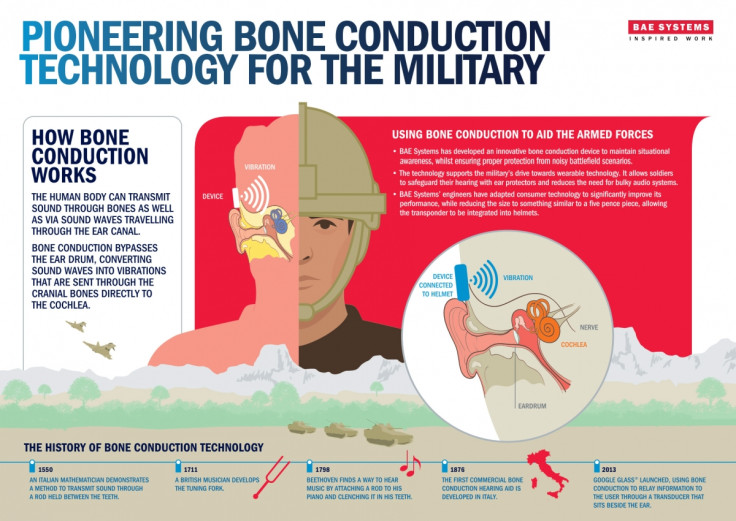BAE Systems developing bone conduction helmets to help soldiers hear radio over battle noises

BAE Systems is working to increase safety for soldiers by developing a new type of helmet that enables soldiers to hear radio commands from their superiors, even while wearing ear protectors.
Warfare is not a quiet business, and soldiers need to take care of their hearing by protecting themselves from extremely loud noises using ear protectors, but this makes it difficult for them to hear instructions from commanders coming in over the radio.
To solve this problem, BAE Systems is taking a leaf out of the books of consumer headphone manufacturers, some of whom are now using bone conduction, which converts sound waves into vibrations that pass straight through your skull, skipping the eardrum to get to your inner ear.
The technology was first demonstrated in 1550 by Italian mathematician Gerolamo Cardano, who held a rod between his teeth. In 1798 the composer Beethoven, who was nearly deaf, bit on to a rod attached to his piano in order to hear music through his jawbone.
And in more recent years, researchers have realised that bone conduction is actually safer for the ears than conventional headphones.
Inspired by conventional consumer bone conduction tech

Today there are several brands that make bone conduction headphones, including Audio Bone, Aftershokz and Panasonic, and the technology is used in Google Glass, as well as in a headset for the blind by Microsoft.
Keen to reduce the amount of gear that soldiers need to wear, the helmet is able to pick up radio communications and convert the audio waves using a transducer that is only the size of a five pence coin.
"We recognise that on the battlefield, auditory situational awareness is essential for armed forces personnel. With this system, the soldiers can safeguard their hearing with ear protectors whilst still clearly receiving military voice communications, to enable them to perform their roles efficiently and safely," said Mohammed Akhmad, principal scientist at BAE Systems.
"Through collaborating directly with our customer, we are able to understand their operational challenges and translate them into technical solutions.
"The key to this concept is that we have been able to utilise off-the-shelf technology and apply our specialist engineering expertise to greatly reduce the time it takes to develop a new prototype. In doing so, we have developed an audio system that offers enhanced capabilities for the military domain."
© Copyright IBTimes 2025. All rights reserved.






















